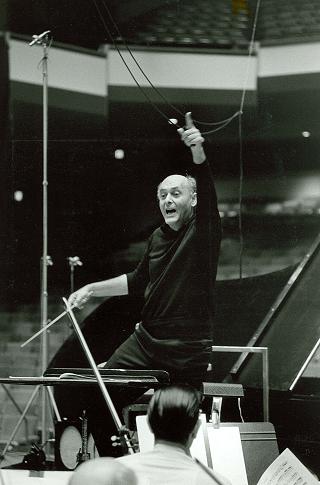CSO to Give World Premiere at Krannert Center

Composer Osvaldo Golijov Yoni Golijov
On Thursday, November 7, the Chicago Symphony Orchestra returns to the Krannert Center for the Performing Arts—its downstate home away from home. Led by Music Director Emeritus for Life Riccardo Muti, the CSO will transport audiences from Muti’s native Italy, with a boisterous overture by Donizetti and sumptuous ballet music by Verdi, to the landscapes of southern Spain, with dance-inspired works by Falla and Chabrier. Plus, Osvaldo Golijov’s Megalopolis Suite, a CSO commission and world premiere, will feature music from his score to Francis Ford Coppola’s epic film Megalopolis (2024).
The CSO has maintained a close relationship with Krannert since the venue’s early days. Completed in 1969, the Krannert Center for the Performing Arts is considered the nation’s premier university-based performing arts center. One key to this reputation is the superior acoustics of the Foellinger Great Hall, designed by architect Max Abramowitz and acoustician Cyril Harris, whose claim to fame is acoustically engineering the Metropolitan Opera and Avery Fisher Hall at Lincoln Center (now David Geffen Hall). Every detail of the Great Hall was designed to optimize the acoustics for unamplified classical music, from the shape of the ceiling to the upholstery of the seats and the Indiana butternut wood of the walls. The hall’s acoustic balance and warmth have drawn musicians from around the world to record and perform there, including the CSO.

Sir Georg Solti recording in Krannert in May 1971
Photo Credit: Rosenthal Archives of the Chicago Symphony Orchestra AssociationIn the early 1970s, the CSO made hallmark recordings in the Great Hall under the baton of then-music director Sir Georg Solti. Between 1971 and 1972, they recorded all five Beethoven piano concertos with pianist Vladimir Ashkenazy, earning a 1973 Grammy Award for Best Classical Performance—Instrumental Soloist or Soloists (with orchestra). When Solti set out to record Beethoven’s complete symphonies, he again chose Krannert to record the epic Ninth in 1972, the set earning him another Grammy in 1975. He would go on to win 24 Grammys with the CSO, including for Mahler’s Seventh Symphony (1972) and Berlioz’s Symphonie fantastique (1974), both recorded at Krannert. Mahler’s Das Lied von der Erde was also partly recorded there in 1972.
The CSO has returned to perform at Krannert nearly every season since. The November 7 concert promises to showcase Muti at his best in repertoire of his home country as one of the most esteemed interpreters of Verdi. Though the concert will also feature music that evokes southern Spain, it maintains a distinctly Italian flavor with the world premiere of Osvaldo Golijov’s Megalopolis Suite, written for Italian film director Francis Ford Coppola’s epic science fiction drama Megalopolis (2024). The CSO will perform this suite for the first time at Krannert before bringing the program to Chicago’s Symphony Center on November 8 and 9.
Set in “New Rome,” an alternate-reality 21st-century New York City, Megalopolis draws parallels between the fall of the Roman Republic and the future of the United States. In the film, architect Cesar Catilina (played by Adam Driver) butts heads with the corrupt Mayor Franklyn Cicero (played by Giancarlo Esposito), who opposes Catilina’s plans to build the futuristic utopia of “Megalopolis.” Over 40 years in the making, Megalopolis is Coppola’s passion project, which reviewer Brian Tallerico of RogerEbert.com likens to “wandering through the dreams of one of the most important filmmakers of all time.”
Coppola approached Golijov to write the score for Megalopolis over 20 years ago. In the intervening period, they collaborated on three smaller films: Youth Without Youth (2007), Tetro (2009), and Twixt (2011). As the son of a composer and flutist, Coppola has a deep-seated appreciation for classical music. He specifically sought out a concert composer to score this film, emphasizing that the score had to have innate musical integrity and stand on its own. Perhaps that is why it works well in concert suite form.
In his program note on the Megalopolis Suite, Golijov writes, “Francis wanted music to play an important role for audiences to believe that we are in Rome. Nobody knows how Ancient Rome sounded, but we all have Hollywood’s ‘Rome’ in our metabolism: we believe that Rome sounded like, for instance, Miklós Rózsa’s score for Ben Hur.”
Golijov’s Megalopolis Suite distills the film score into four movements. The first, Roma, includes most of the score’s “Roman themes,” which feature heavily in the film. These include an imperial fanfare that recurs throughout like a chorus, a heroic section that alternates between nobility and pomposity, sensuous “Cleopatra-like” interludes that bear a distinctly Egyptian flavor, and a lyrical version of the heroic theme.
The second movement, Love Is in the Air, is a “noir version” of the love theme for Julia (played by Nathalie Emmanuel) and Cesar. The third movement, Death Kiss Utopia, opens with the film’s other romantic leitmotif, a “tragic, sinuous theme” for the love story between Cesar and his first wife, Sunny (played by Haley Sims). The final movement, Saturnalia, “continues with a main section featuring both love themes in counterpoint and a reprise of the ‘Heroic Rome’ theme,” Golijov writes. “It ends with a fast fugato on the strings sustaining the Rome Fanfare in the brass.”
Just as the film is full of cinematic references, so is the score rife with musical references. Golijov explains, “Visually speaking, Francis told me how he could name a film that inspired almost every frame in Megalopolis. Accordingly, he also wanted specific musical references, such as Rózsa’s Roman music, or Herrmann’s music for Hitchcock, or Prokofiev’s Romeo and Juliet.” Golijov treated the musical references like organ registrations to “integrate both the story and the music with our own ‘library’ as an audience and make both the story and the music richer.”
After nearly a decade of silence, Golijov is reemerging as a composer in high demand. This month also sees the long-awaited Metropolitan Opera premiere of his 2003 flamenco-infused opera Ainadamar. The opera centers on the life of Spanish poet-playwright Federico García Lorca, who was assassinated by Fascist forces in 1936 at Ainadamar, a medieval aqueduct known in Spanish as “Fuente de Lágrimas” (Fountain of Tears).
Golijov had been a CSO Mead Composer-In-Residence from 2006 to 2010. After finishing the score for Coppola’s Twixt in 2011 and writing a short piece for the Tanglewood Festival, depression forced him into a creative hiatus until 2018, when he began working on a song cycle called Falling Out of Time based on Israeli novelist David Grossman’s 2011 book of the same title. Although Ainadamar has not disappeared from the repertory, this new Met production—coupled with Megalopolis and the recent success of Falling Out of Time—marks a renaissance for the 63-year-old composer.
Although tickets are currently sold out for the CSO’s November 7 performance at the Krannert Center for the Performing Arts, you can join the waitlist here.



